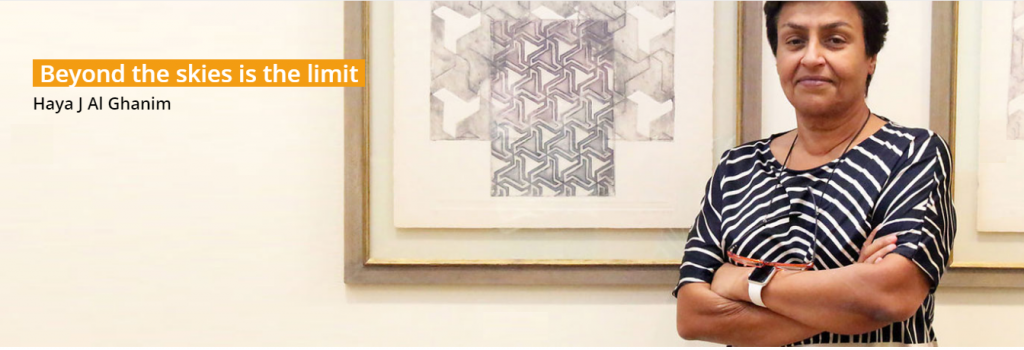Haya Al Ghanim | Business Woman Kuwait
http://hayajalghanim.com/ Ms. Haya J Alghanim, chairperson of ePortal Holding Co., is one of most dynamic
Need for a connected Arab world.
Over the years of human history, the world has shrunk in front of man’s unceasing quest to create a comprehensively connected planet. It continues to shrink, much beyond our imagination, today more than ever, as the technological shifts ensue in this new age of digitization. This latest phase of the internet will bring many opportunities to revolutionize the world. Real time solutions are now fundamentally changing the way we will live, the way we connect and the way we do business. It is a sensational change that will touch every person, every sector, every field and every nation.
Over the past decade, countries of the GCC have taken steps to liberalize their economies and diversify them away from the traditional oil-based sector. The internet is quickly emerging as one of the most important tools for business and social development in the Middle East. Connecting people in the region to each other and to the rest of the world, through a safe, secure and accessible internet is crucial to the future of the Middle East. The connection of cities, companies, and countries to the internet is the digital transformation that will pave way for sustainable growth and improving society as well as lives.
Doubtless, it will be those countries that take advantage of the digital transformation that will realize possibilities for innovation, growth and jobs in the future. Leaders of the region having realized this, are effectively moving in the direction of e-commerce and e-government in order to propel their economies. The GCC countries have already launched their e-Governance programmes, with Dubai entering into the next phase with the launch of Dubai Smart Governance. The emergence of the Internet of Things (IoT) is helping nations and organizations enhance their operations, develop new business models, and deliver innovative services. IoT will continue to reform every sector in the GCC region, be it banking or supply chain management or traffic and energy managements making it the focal point of the digital future.
The vision of emergence of Dubai as the ‘Smartest City in the World by 2017’ is happening under way. Everything from services to transportation, entertainment to energy and policing to governance, will be connected by the embedded sensors throughout the city. Initiatives like WiFi UAE offers basic free online access at hundreds of locations including the Dubai Metro. This is necessary in a highly-urbanised GCC with some of the highest smartphone penetration rates in the world. Qatar has unveiled its National Vision 2030 to turn Qatar into a digitally advanced country, transforming the fields of education, healthcare, energy, security, and transportation. KSA is devoting billions of dollars to build four new ‘Economic Cities’, in order to support the creation of a knowledge-based economy to move from its over dependence on the hydrocarbon sector.
Thus, the infrastructure and technology upgrades across the GCC region are today integrating with IoT projects. With major international events such as Dubai Expo 2020 and the 2022 FIFA World Cup around the corner it can be presumed with confidence that such events will serve to increase IoT investments in the region. The governments as well as the private sector must focus on implementing IoT applications to improve operational efficiencies and enhance customer/citizen services. The region, no doubt, benefits from a high penetration of mobile devices and availability of the latest generation of mobile networks, which is driving IoT projects.
In an IoT ecosystem, connected to and with thousands of devices, there is a real risk of occurrences of security breaches. Unauthorized access and misuse of personal information, which in turn can create a risk to personal safety is a real threat in the virtual world. Privacy risks may also arise from the collection of personal data over time. GCC countries need to strengthen their cyber capabilities and improve their existing security partnerships in order to address cyber security as they go forward. With IoT, traditional means of identification and authentication such as passwords and PIN codes must be substituted by biometric access management systems.
The many colossal leaps that the nations continue to make will certainly transform how people connect with their governments and with each other. It also marks the beginning of a truly digital Middle East that will create new jobs, further innovation and help ensure advantage in the highly competitive world. Digitization is dramatically reshaping the realms we live in. It can be said with certitude that no nation will be able to elude or ignore its dominance. Middle East business and government leaders should embrace the opportunity and strongly lead the nations, as the information age of today slowly transits to the digital age of tomorrow.
For detailed information, visit our website, www.hayajalghanim.com
More Links
http://hayajalghanim.com/abouthaya
http://hayajalghanim.com/a-disruptive-success-story-waiting-to-unfold
http://hayajalghanim.com/winning-ways-for-women-empowerment
http://hayajalghanim.com/women-entrepreneurs-seeking-new-horizons-beyond-their-comfort-zones
http://hayajalghanim.com/quisque-dignissim-consequat-convallis
http://hayajalghanim.com/maecenas-non-libero-et-lacus-congue-condimentu








